#Aftermath: Empire's End
Text
Here's a personal project I'v been working on for a little while about my favourite star wars villain, Grand Admiral Rae Sloane! 😭🙏🏿
youtube
Been thinking of doing this little project for a while and used it as an opportunity to try a bunch of stuff I haven't before like being serious about 3d backgrounds and animation compositing. Learned a million different things during this process and will bring all that forward to future projects.
Mostly built around Sloane and Adea Rite. My favourite parts of Aftermath Life Debt.
#star wars#2d animation#grand admiral rae sloane#rae sloane#fanart#adea rite#gallius rax#star wars aftermath#star wars aftermath life debt#star wars aftermath empires end#lucasfilm#Youtube#the mandalorian#the shadow council#moff gideon#thrawn
51 notes
·
View notes
Text
can you imagine if krennic took armitage under his wing?
#star wars#armitage hux#hux#general hux#director krennic#orson krennic#star wars sequels#aftermath empire's end
15 notes
·
View notes
Quote
The Force is in all living things. It is what gives us our intuition, our drive, it's what connects us to one another. We are all one with the Force.
from Aftermath: Empire’s End by Chuck Wendig
#star wars#aftermath#aftermath trilogy#the aftermath trilogy#aftermath empire's end#empire's end#chuck wendig#the force#we are all one with the force#i am one with the force#the force is with me
24 notes
·
View notes
Text
We know for a fact that there was a bar on the Death Star because Sinjir lived there.
#He mentions this fact in Aftermath... I think it was Empire’s End#⋆✶― admiral ackbar superiority ―✶― ooc
4 notes
·
View notes
Text
Han: Ben was concieved on Endor.
Leia: Ben was concieved on the Falcon.
Fans after TPATS was announced: OH! THAT MEAN BEN SOLO WAS CONCIEVED IN THE HALCYON??
This jokes about Kylo Ren being concieved on a Disney hotel are kind of funny 😂 but do people didn't read the other books?? Like, even when Han and Leia never said Ben was concieved here or there, they make comments about how Ben was born (Han remembers a night on the threes of Endor and Leia remembers how they ended up doing other "activities" while they traveled on the Falcon and that those "activities" had as a result Ben being born moths later). I don't think Ben was concieved on Endor since there's few moths between Endor and Leia getting pregnant so I'm believing Leia on the matter.
#star wars#leia organa#han solo#ben solo#did i just write about this??#i guess it is a yes#so cringy im sorry#but it does makes me laught how they mention han and leia having sex and concieving Ben#i also find it cute#okay anyway#the princess and the scoundrel#bloodline#aftermath empire's end#spoilers#??? i guess
12 notes
·
View notes
Text

A tiny vicious protégé.
#he's only five#also the seedling of the movement that becomes the first order#hello woman initiated reign of terror#from Aftermath Empire's End
8 notes
·
View notes
Note
portia during Jyn's dead's dead scene?
Send me an episode/chapter/scene/ect. and I'll tell you what my OC was doing during it
portia was with the whole r1 crew when they went to eadu, since cassian had just dragged her off jedha. it was a complicated moment for her though, because she wanted to work towards destroying the empire with the others but she also had just lost saw (and the rest of the partisans, for all she knew), and focusing on anything other than that proved difficult.
if she'd been thinking more clearly, she probably would've gone with jyn out of some lingering need to protect her, or with cassian to see what he was really up to. in reality, she ended up trailing along with bodhi to find a new ship, too caught up with her own crap to really care what the others were doing, so she missed the drama of galen's actual death.
#oc tag#ch: portia zhaori#tysm for asking about portia! i hope this is what you meant?#also portia's involvement in the direct aftermath of that scene is complicated as well#jyn and her used to be close (in a mean sibling kind of way) but portia doesn't feel bad about galen's death#because she's not sure if she believes he truly was working against the empire from within#and she struggles to get past that he was an 'imperial'#if anything portia kind of sides with cassian a little there because she understands better than all of them about following orders#and doing extreme things for the sake of stopping the empire#but the last thing cassian wants is Portia's support so they all end up fighting adjfgsdf#since her default when she's in pain or emotional is to bite back#rip
1 note
·
View note
Quote
What's Han Solo & Chewbacca adventure star Wars: uprising Aftermath: Empire's end (Mentioned only) the legends of luke Skywalker before the awakening force Collector
archwhsbsjail
#QUOTE#DAY 16#What's Han solo & chewbacca adventure star Wars: uprising Aftermath: empire's end (Mentioned only) SERVANTS of the Empire: rebel in the Rank
1 note
·
View note
Text
Rank And Responsibility. Or: The Hairpin Scene from Jinshi's POV.
Be warned now about the consequences of choosing to do an English Lit degree - you end up doing lit crit for fun. With that in mind, let's break down the hairpin scene at the end of Covert Operations (Episode 5). Mild spoilers for Jinshi's arc are below.
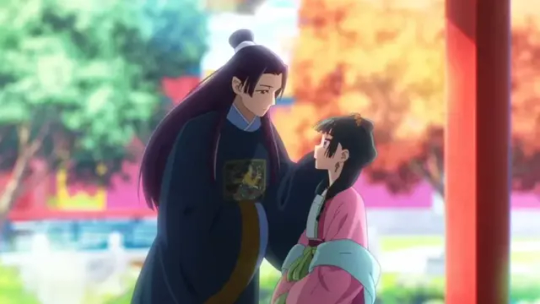
While this moment does kick off the romantic subplot, with all the implications that giving Maomao the hairpin out of his own hair has, I would argue that this is not the moment Jinshi realizes he's in love with Maomao. Instead, from his point of view, this scene demonstrates how Jinshi handles failure.
Holding Power In An Open Palm
This is still very early in the story. Our first hint to Jinshi's true rank does come in this scene, but for now we know him as the manager of the Rear Palace. For the three thousand people who live and work there, for all intents and purposes, Jinshi is the highest authority they will encounter. He literally has the power of life and death over them, either directly in the case of the servants and eunuchs, or in the case of the consorts, his word to the Emperor directly can serve the same purpose. We also see Jinshi use this power early on - he's not just there to keep order, but also to test the consorts' loyalties and virtue. We never see what happens to the lower-ranked consort who attempted to invite Jinshi back to her room, but at the very least that report ensures that her already small chance of the Emperor choosing her as a potential mother of the nation is utterly cut off - and if she doesn't bear children, she will be discarded.
We also know that Jinshi will not hesitate to order corporal punishment if he views it necessary - for example, when Maomao discovers that the toxic face powder is still being used by Consort Lihua's ladies in waiting, she mentions in the aftermath that the eunuch who failed to recover the powder was flogged, while the lady in waiting who hid the powder is put in solitary confinement. These are brutal punishments - and if we consider the historical inspirations, these are also very restrained consequences. For hiding an item that caused the death of the prince (unfortunately, the more valuable child) and has put the life of one of the Emperor's favored High Consorts in danger, Jinshi would be utterly within his rights to order executions. If ignorance is a sin, ignorance in the face of knowledge is a greater one.
Microcosm of Li
For all that Jinshi holds his power lightly, he also takes the responsibility that power bestows upon him quite seriously. It's worth noting that Jinshi takes over governing the Rear Palace shortly after Maomao's service contract is purchased. (Remember, Xiaolan talks about the "beautiful, new eunuch that's been posted to the central courtyard," which tells us that Jinshi has not been in the Rear Palace long enough to become a fixture - he's an object of speculation and admiration from episode 1).
In context it's clear that, with the birth of two Imperial children, his job is to ensure the survival of the Imperial line and investigate why children of the Emperor are dying consistently in one of the wealthiest and safest places in the entire empire. We're shown him running in between Lady Lihua and Lady Gyokuyou to ensure that their very sick children are being seen to properly, investigating what could be causing it, while also managing tensions as rumors about the Emperor's children being cursed begin to spread and outright accusations of sorcery are being thrown between consorts. While the audience might immediately scoff along with Maomao at the idea of one consort cursing another, if Maomao hadn't found the cause of death, those types of accusations followed by Lady Lihua's and Princess Lingli's inevitable deaths could have ended with Lady Gyokuyou's execution.
The Rear Palace is a reflection of the nation as a whole. No Imperial heirs plus the deaths of two High Consorts with various foreign and domestic political ties had the potential to thrust the entire nation into chaos. Jinshi's choices have very real consequences, so when Maomao discovers what the true cause of death is and sends her warning, Jinshi looks at Maomao and doesn't see a person. He sees a "perfect pawn." A tool, one with talents that have ensured that at least one Imperial child has survived and providing a rational explanation why these children have died so that it can be prevented from happening again - and a skill set that can be turned to preventing any more shenanigans in the Rear Palace that could threaten the empire's foundation.
And, as Gaoshun points out, in the beginning of the hairpin scene, she is a toy. Maomao amuses Jinshi up until this point.
For all that Jinshi is shown wielding power with a light hand and a responsible mindset, it literally doesn't occur to him that the people working in the rear palace have stories - some tragic - about how they came to be there. They are resources to be used as befits the Emperor's (and therefore the nation's) need.
Hidden Beauty
When Maomao turns around and Jinshi doesn't recognize her until she speaks, he's shocked. He thought he knew exactly who and what this girl was - ugly and unremarkable, except for her intellectual brilliance and the challenge in managing her by other means than empty compliments and smiles. He attempts to recover and assumes that she is enhancing her looks - and is shocked again when he realizes that the face Maomao has presented to him so far is a protective mask against attracting attention. In a world where beauty is both a currency and a tool that others covet, Jinshi doesn't understand why Maomao would deliberately devalue herself like that. So she tells him.
This is the moment Maomao becomes a person to Jinshi.
Not a toy, not a pawn. Someone who has been ripped from her home and her life illegally and sold off. It's in this moment that Jinshi is forced to confront the ugly side of the society he lives in, people who would rape Maomao out of pure convenience or just take a "borderline marketable" girl off the street in order to get extra drinking money.
Worse, Jinshi is complicit in Maomao's captivity. The Rear Palace has bought her contract - and as the manager of the Rear Palace, Jinshi is responsible for everything that happens within its' walls. The fact that Jinshi does not personally oversee service contracts is irrelevant. The buck stops with him. If the Matron of the Serving Women or whoever is below her is buying these contracts without checking their sources, that is Jinshi's fault because he has allowed a lax enough system to flourish. He has failed to govern this microcosm of the nation wisely, with thought for the welfare of the least powerful among his people. Worse, he has failed to even notice the problem - Maomao may say she's angry about having been kidnapped and sold, but she doesn't react in a way that indicates anger. Instead, she's resigned. Yes, what happened to her was wrong and she's angry about it, but there's literally nothing she or Jinshi can do.
Or Is There?
Jinshi offers Maomao two apologies, the first of which is our first hint to his true status. "I'm sorry we couldn't police them better." Maomao immediately blows off this apology - she points out that there's no way Jinshi should have known and has a very "all's well that ends well" attitude about her situation - her contract will be up eventually and in the meantime she's managed to land in a fulfilling role. Essentially Maomao is telling Jinshi that this apology is not his to make - he's overstepping his responsibility. And, if Jinshi were simply the manager of the Rear Palace, she would be right. It's his job to ensure that the Rear Palace is properly staffed, not to regulate that all contracts comply with the law.
Jinshi apologizes again. This time, he offers no other context. He doesn't accept Maomao's absolution of responsibility - because he knows (even if we, the audience, don't) otherwise. It can certainly be read as Jinshi refusing to accept easy absolution, and the rest of those witnessing the scene, apart from Gaoshun, certainly take it that way.
Instead, he takes the hair stick from his own hair and places it in Maomao's. Their entire relationship has just been upended; Maomao is a person who has been gravely wronged and it is Jinshi's responsibility to begin to make it right. Aside from the personal implications of giving her the hairpin (and the faint blush on his face makes it clear that he's aware of them), it is a form of restitution. There is an unspoken social contract Jinshi is offering that Maomao does not understand in the slightest. It never occurs to her that Jinshi would do something for her with no thought of what he would receive in return, because of the difference in their social ranks. But, from Jinshi's perspective, that social difference is the point. He has failed her and, as the person of higher rank, it is his responsibility to do what is within his power to begin to remedy the situation in front of him.
And, of course, in that moment he sees Maomao in a new light, the other meaning of gifting her his hairpin has fertile ground to take root in Jinshi's mind.
#the apothecary diaries#kusuriya no hitorigoto#jinshi#maomao#jinmao#long text post#apothecary diaries meta#kusuriya anime#knh#jinshi x maomao#jinshi and maomao#lady gyokuyou#lady lihua#princess lingli#gaoshun#hair pin#episode 5#covert operations
465 notes
·
View notes
Text
gale & curing the orb - early access
writing my current series of cut content from early access made me think a lot, especially about how curing gale of the orb might have originally worked out if larian had kept to what had been set up in early access. it's no secret that a lot of things were changed or cut entirely, big and small, like for instance halsin's involvement with ketheric's fall, isobel and the shadow curse.
gale's condition, too, seemed different then.
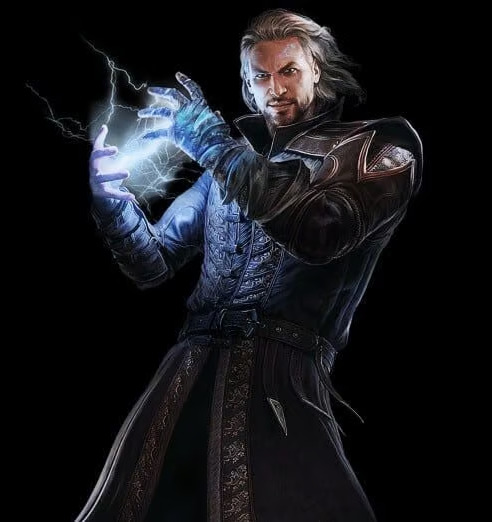
what exactly was different in early access?
while only a few body models were unique in early access, gale's key art showed his left arm in bandages.
in early access, auntie ethel had vicious mockery lines, which hinted what might be beneath those bandages:
Auntie Ethel: I can smell what's under those bandages, wizard. You're all rot and ruin. Come to greet death early? You'll be a lovely spectacle.
we also had information from gale directly as to what happened to karsus in the aftermath of casting his spell:
Player: I was wondering about that “mighty lord” you told me about in your story.
Gale: Ah, yes. Karsus Karsus was perhaps the most powerful wizard that ever lived. The child-who-would-be-a-god, the elves called him. And he tried. With a spell of his own devising he endeavoured to usurp in one fell swoop the power of the goddess of magic. Mystryl, she was called then. Imagine what it must have felt like. To be a god. To know yourself to be untouchable. To be mistaken. As Karsus aimed his spell at her she began to unravel, and with her, the entire Weave. Too late did he realize what he had unleashed. It would have been the end of everything had not Mystryl sacrificed herself.
Gale: The goddess of magic is all magic. By dying, the entire weave was lost, and the spell that challenged a god failed. It was the end of Mystryl, the end of Karsus, and the end of an entire civilization. As the child-who-would-be-a-god was turned to stone, his empire came crashing down around him. The floating cities of Netheril were no more. An event that came to be known as Karsus’ folly.
which is in accordance with the lore:
Unfortunately, his choice was a terrible mistake, for one of the responsibilities of the deity of magic was to regulate the flow of magic to and from all beings, spells, and magic items in the world. Lacking the ability to do so properly, magic surged and fluctuated. With her last remaining bit of power, Mystryl sacrificed herself to block Karsus's access to the Weave, causing all magic to fail. The flying cities of Netheril plummeted to the earth. The severing of the link also killed Karsus and transformed him into stone, and the last thing he saw was his entire civilization being destroyed because of his actions. This was to be known as Karsus's Folly. The stone form of Karsus eventually landed in a part of the High Forest, now called the Dire Wood. The city of Karse was built around its base.
Karsus was never accepted as a petitioner by any god, nor did he go to the Fugue Plane when he died. Instead, his soul was bound to the Material Plane. Those with experience in pact magic could call up his vestige, where he appeared as a giant blood-red boulder, like the one found in the High Forest where his petrified form landed. Blood burbles up from the top of the stone, trickling down the side facing the summoner, pooling at the base. When he spoke, the pool fountained upwards, its height varying on the volume of his voice.
the netherese orb then seemed to have a immediate visible physical effect on gale, in addition to the ones that carried to the full release version of the game.
so putting these clues together, i think it's safe to say that the orb caused gale in early access to be afflicted with some form of corrupted petrification, which makes sense given that it's a piece of magic unleashed during karsus's folly.
at that point, this corruption seemed to be affecting his left arm the most, perhaps either from opening the book containing the netherese magic with it, or trying to shield himself with it - but that's just speculation on my part.
so what did the early access set up in terms of curing gale from his affliction?
gale in early access showed a great interest in the astral plane, especially in the absence of time there. he has several banters with lae'zel, which are still in the game now and showing his vested interest in the astral plane as well as any knowledge or insight lae'zel might offer on it:

Gale asks Lae'zel about the Astral Plane. Has she been there?
Gale: Tell me, Lae'zel, what is it like on the Astral Plane? Your home realm intrigues me.
Lae'zel: Githyanki lay their eggs on other planes. They cannot mature in the Astral.
Lae'zel: I will only be welcomed once I obtain a mind flayer's head.
lae'zel notices gale's interest and initiates a banter of her own:

Lae'zel asks Gale what his interest is in the Astral plane, and he equivocates
Lae'zel: Tell me, Gale: what is your interest in the Astral Plane?
Gale: Time. Or rather: the absence of it. In the Astral Plane, everything is eternal.
Lae'zel: It will be my home soon enough, should Vlaakith will it.
in addition to these banters, which clearly show gale's interest in the astral plane - which now in the full release seems merely academic - hinted at another solution to ridding himself of the orb.
what points to that quite conclusively is gale's dialogue when he reveals the truth about the orb to the protagonist.
this reveal differs quite significantly from the full release version. most notably, the protagonist was able to ask him about his own ideas for a what might be able to cure him from the orb.
gale had something very interesting to say to that question:
Player: What would permanently rid you of the orb?
Gale: The orb was kept safe and inert in a pocket of Astral Plane, suspended in time. If I can somehow manage to expel it from my body while in the Astral Plane, it will be rendered inert again.
Alternatively, I could learn to control it’s chaotic magic, that is; to succeed where I failed before. But without Mystra’s favour, I don’t see how that may come to pass.
Of course there could be different answers as well. Faerun brims with more magic than any one wizard could fathom, let alone comprehend. Who knows what outlandish solutions may yet present themselves?
so what does this all mean?
in conclusion, i believe originally there were either more ways to cure gale from the orb - or maybe even in a different manner entirely - than there are in the full release version of the game (begging mystra to remove it, ascension, or accepting/keeping the orb).
perhaps even one that would circumvent having to beg mystra for forgiveness entirely, without gale having to sacrifice his mortality to do so.
i think these banters and lines of dialogue show that the astral plane, which would have rendered the orb inert and stopped the corrupted petrification of his body, would have played a bigger role in gale's quest.
#gale dekarios#gale of waterdeep#karsus#baldur's gate 3#bg3#baldurs gate 3#bg3 meta#bg3 early access#ch: gale dekarios#vg: baldur's gate 3#series: baldur's gate#meta: mybg3
401 notes
·
View notes
Text
Frederick Sinclair is a really interesting foil to Mr. House. I mean you start digging into this and it's just parallel after parallel after parallel. Start at the high level. House sinks inordinate amounts of resources into saving the city of Las Vegas - not the people, but the city- from nuclear destruction; as long as the stage endures, he can get anyone to wear the costumes. Sinclair sets up an entirely new "community" totally off-the-grid for the sake of protecting one woman, plasters that place with her likeness. House is a visionary with a 200-year action plan to rebuild society in his image, bootstrap space exploration, and construct an interplanetary empire; Sinclair sank everything he had into building the most secure facility possible for a woman who he knew was terminally ill anyway, just to ensure that her last few years lived in the aftermath of the nuclear apocalypse would be as comfortable as possible- there's a fundamental pessimism baked into what he was doing. Both House and Sinclair relied heavily on automated defensive systems and cutting-edge, esoteric technologies to accomplish their ends, but House built his power base on proprietary robotics and computing technology, much of which he personally designed- an outgrowth of his policy of never widening his circle any more than he absolutely has to. Sinclair, in his naive techno-optimism, outsourced his utopia, grabbing flashy third-party technologies like a kid in a candy store- opening a backdoor for the Think Tank to poison his city and ultimately getting everyone at the Gala Event killed when the holograms malfunctioned and went berserk.
Their management styles are inverse. House allows countless abuses to occur under his aegis because he subscribes to a libertarian-when-convenient philosophy where he doesn't much care what the little people do as long as he gets his cut and they don't rock the boat too much- a hands-off approach that fosters resentment amongst his subordinates, lets the White Gloves and Omertas get up to untold levels of fuckery while Freeside languishes and Benny conspires against him. Sinclair, by contrast, had a sincerely-held utopian-straight-edge safety-first micromanagement approach built into the very bones of the casino, he appeared to genuinely give a shit about the safety of the construction crew on the villa, and he was well-liked by nearly everyone who had any direct contact with him- and yet untold horrors also went down under his aegis, because his myopic focus on building the vault for Vera let Dean Domino and the Think Tank run circles around him, good intentions be damned. Their respective interpersonal dispassion and obsession are on display in how they react to betrayal. House's tone never rises above exasperation when it comes time to clean house of Benny, the Omerta Leadership and the White gloves; he treats them as problems to be solved, gears that are slightly out of alignment; By contrast, when Sinclair learns that Dean and Vera have been playing him, he channels the monomaniacal energy he previously directed towards protecting Vera towards the goal of building the perfect poetic-ironic death trap for her and Dean.
There are some other parallels in their personal lives. For one thing they both trusted a pastiche of a 40s lounge singer a lot more than they should have. They both tried to digitize, immortalize their girlfriends- and the discrepancy in how they went about it is telling. House's recreation of Jane isn't terribly robust, and in terms of House's overall project she's an afterthought. She's more a sock-puppet than a person, a sanded-down copy of a woman who died forever-and-a-half ago, forever agreeable, never saying no. Convenient. Only the most superficial visual elements preserved- an illustration of her face on a robotic chassis. Sinclair was obsessive in recreating Vera, preserving her likeness. It's all over the villa, her hologram is everywhere, her voice is everywhere. The terminal in the lightwave lab in Old World Blues reveals that he was still obsessed with getting her hologram right even after the love curdled into hate. All of it a monument to the real woman, and yet in all of it the real woman is still lost, buried under the mythologized projection. He didn't respect the real person enough to let her know that she was dying. A total failure of preservation from the opposite direction. (Except in the suites, where you can hear her very authentic dying pleas.)
You find both of them in their basements. House only looks a little better than Sinclair, but he's got much more of a voice in the narrative. He took steps to make sure he'd be around to tell you what he thinks about everything, fine-tuned the voice with which he speaks to the world, the face he presents. It matters to him that he gets to tell his own story. We find out a lot about House, from House; but for the kind of figure that he is, a shocking amount of what we learn about Sinclair comes from other people, people who knew him or wrote about him. The only image of him you can find is a downplayed element of a larger mosaic. The two documents you find that're written from his perspective have been buried for 200 years, and they're yards from his corpse. And the more recent of the two is an apology. I mean admittedly at the point where he wrote that apology Sinclair was personally turbofucked regardless. If the cloud didn't get him the holograms would have, or the radiation, or, or, or. You can read some level of ego into what he did in the face of that. But however futile it was, he died in the specific way that he did because he recognized that he'd done something awful, and he was trying everything he could think of to correct it. Somehow I find it very hard to imagine House doing either of those things- admitting fault or putting skin of his own in the game to make it right.
#fallout#fallout new vegas#fnv#mr house#frederick sinclair#meta#vera keyes#fallout jane#dead money#thoughts#fallout: new vegas#robert house
474 notes
·
View notes
Text
The Bad Batch Finale and Joel Aron’s cryptic tweet
Okay so Joel Aron, Director of Cinematography Lighting & VFX at Lucasfilm, tweeted this:
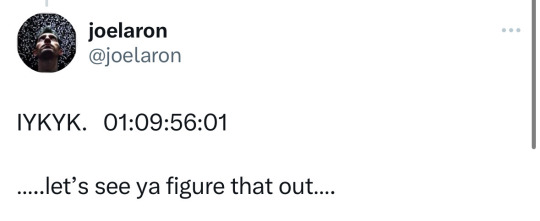
Initially, I thought that this was going to be the runtime of S3E15 The Cavalry Has Arrived. This episode being longer would make sense as it’s the finale of the show and it’s close in length to S1E1 Aftermath. However, I saw a screenshot floating around the other day that says the runtime of the final episode “spans 24 to 25 minutes”.
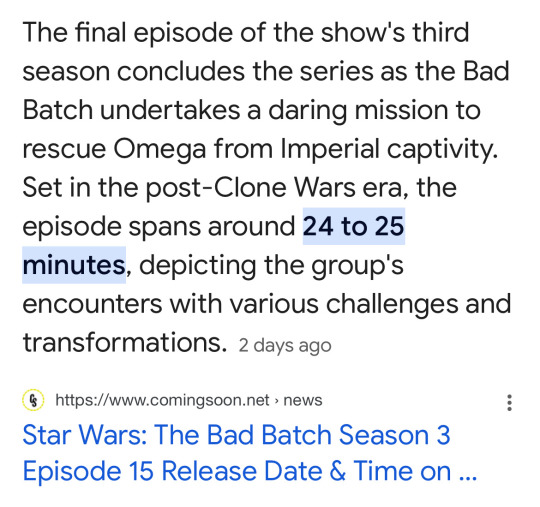
If this episode is the typical length then this timestamp must be referring to a different piece of media. The question is, what media? In an effort to determine what could happen in the finale, I went to that point in the films to see what I would find. None of them strike as much fear in me as what’s happening in A New Hope.
The Phantom Menace - Anakin has just won the pod race and they are celebrating his victory.
Attack of the Clones - Jango Fett and Boba Fett have just attacked Obi-Wan with seismic charges.
Revenge of the Sith - Anakin is looking out over Coruscant from the Jedi Council room. He has just revealed to Mace Windu that Palpatine is a Sith.
A New Hope - Before leaving to disable the tractor beam on the Death Star, Obi-Wan delivers a line which may foreshadow what’s to come in The Bad Batch.
Empire Strikes Back - Luke is trying to lift the ship out of the swamp on Dagobah.
Return of the Jedi - Luke, Han, and Chewbacca, along with the droids, are captured by the Ewoks.
Star Wars: The Clone Wars - Anakin and Ahsoka are heading towards Tatooine to deliver Jabba’s son back to him.
At 01:09:56:01 in A New Hope, or as close to it as I could get (Disney+ sucks) this is what we see:
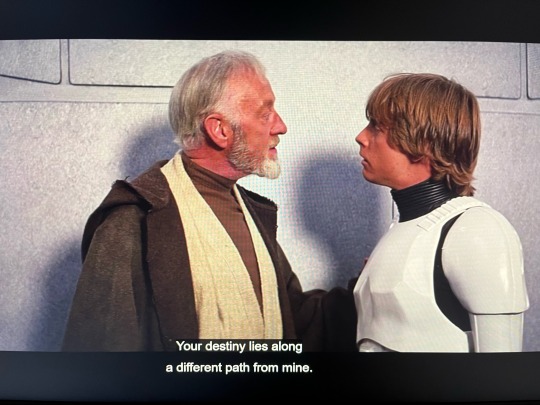
Sorry it’s a photo of my computer, I don’t know how y’all take screenshots of Disney+.
“Your destiny lies along a different path from mine.”
Many people have been theorising that the show could end with the Batch and Omega surviving but being separated, either by choice or by circumstance. This line from A New Hope, as well as the fact that Omega’s voice actor, Michelle Ang, has described the ending as “bittersweet”, definitely make that a solid theory.
Maybe I’m barking up the wrong tree though. There’s also speculation about whether Omega is force sensitive, so maybe Luke using the force in Empire Strikes Back is the real clue. Despite Ventress not believing Omega to have a high m-count, and her not being one of Hemlock’s designated m-count specimens, we have seen characters with a low m-count who were capable of wielding the force. Sabine Wren, for example.

Still, Omega being force sensitive doesn’t prevent the theory that she gets separated from the Batch from being true. It could actually be a reason for that separation because she may pursue training or decide that her proximity to the Batch endangers them.
But wait, there’s more!
At this timestamp in S1E1 Aftermath, Omega is on the Marauder with the Bad Batch (minus Crosshair) and they’re setting off on what will be her first big adventure. Omega’s Theme is playing and she’s gazing out at space with child-like wonder. While they’ve just parted ways with Crosshair, the overall feeling in this scene is hopeful.
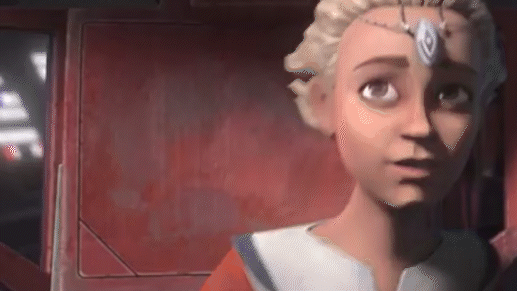
If the tweet is referring to this episode, it could mean that we get a wholesome Bad Batch family moment. Whether Tech is there or not may rely on CX-2 being unmasked. Perhaps it’s bittersweet because Tech truly is dead or because he’s alive but they cannot save him from the Empire. Or maybe it’s bittersweet for a whole host of other reasons.
Honourable mention
@kiffobaby also looked into what is happening at this timestamp if you combine the runtimes (including credits) of all episodes in clone relevant story arcs and didn’t really find anything of note. If credits were removed then it would put at us a different point in the arc, however it’s unlikely that we’d be looking for a timestamp in an arcs combined duration anyway.
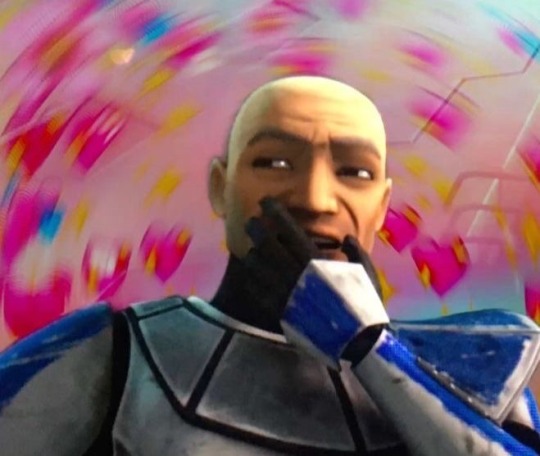
If you’ve read this far, I love you and don’t worry, we’re almost done.
Secret 16th episode?
Seasons 1 and 2 each had 16 episodes which leads me to speculate that this timestamp could actually be the runtime of the final episode, a secret 16th episode.
Is it likely? No. Can I dream? Yes.
#star wars#star wars the bad batch#star wars the clone wars#the bad batch#tbb#bad batch#sw tbb#tbb spoilers#the clone wars#the bad batch spoilers#star wars rebels#the bad batch speculation#star wars the phantom menace#star wars attack of the clones#star wars revenge of the sith#star wars a new hope#star wars empire strikes back#star wars return of the jedi#hunter tbb#hunter the bad batch#tech the bad batch#tech tbb#echo the bad batch#echo tbb#wrecker the bad batch#wrecker tbb#crosshair the bad batch#crosshair tbb#omega the bad batch#omega tbb
143 notes
·
View notes
Quote
Breathe in, breathe out. Be mindful of the world, the galaxy, and your place within it. Everything will be okay.
from Aftermath: Empire’s End by Chuck Wendig
#star wars#aftermath#aftermath trilogy#the aftermath trilogy#aftermath empire's end#empire's end#chuck wendig#breathe#breathe in#breathe out#be mindful#mindful#world#galaxy#your place#everything will be okay
20 notes
·
View notes
Text
I went into this on Twitter but I’m gonna go into again bc I don’t have a character limit over here 🧚
THE SYMBOLISM OF CROSSHAIR LOSING HIS HELMET.
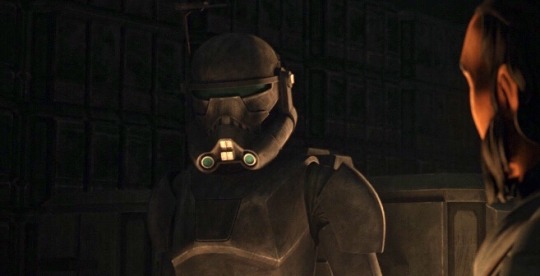
he’s had this helmet since Aftermath. It was one of our first introductions to Imperial Crosshair and the things he was willing to do (and was at first forced to do) to get ahead and be seen as someone important to a higher cause. It represented his loyalty *screams* to the empire and the new goals he had that ended up separating him from the Batch in the s1 finale.

and WHEN HE LOSES IT??? practically every trace of imperial Crosshair is gone too. he doesn’t care if Mayday is dead weight or not, he’s going to get him back to base or die trying. he doesn’t care about what the empire wants anymore. he doesn’t care about being a good soldier. he doesn’t care about orders. he’s more himself than he has been since the chip activated god only knows how long ago. he’s throwing everything to the wind because he cares, because he doesn’t want to be alone again, because he sees too much of the people he cares about *COUGHS* HUNTER AND CODY *COUGHS* in his brother and he can’t stand to lose him too. and then he does anyway. and Crosshair is so done and so broken that he’s literally willing to probably be executed for treason just to avenge Mayday’s death. he was ready to die right there on that godforsaken outpost and he’s not a commander anymore he’s barely even a soldier anymore it’s just. Crosshair. all alone. all over again
#i can’t inhale properly anymore#I’ve loved him for years and it somehow just keeps getting stronger#you don’t understand what he means to me look at this feral cat of a clone and tell me how I’m not supposed to love him with my whole heart#star wars#the clone wars#animated star wars#clone troopers#the bad batch#captain rex#the dad batch#tbb echo#tbb crosshair#tbb hunter#tbb tech#tbb wrecker#tbb omega#commander cody#tbb mayday#bad batch spoilers#the bad batch season 2#bad batch season 2 spoilers
1K notes
·
View notes
Text
It took 2 people to fully convince Crosshair to do a 180 on the Empire - but neither of those people were Bad Batch members.
They couldn't be. What would a squad of defective clones who had been disobeying orders since day 1 know about loyalty to an institution determined to establish order for the good of the galaxy? What would they know about finding purpose in being "good soldiers"?
Now, I DO think the seeds of Crosshair's eventual defection were planted by his brothers. Hunter pointing out that "Blind allegiance makes you a pawn" and then telling Crosshair "All you'll ever be to them is a number" are statements that are proven later to be true. But it takes Cody and Mayday to drive the lessons home.
Cody and Mayday share several characteristics that place them in unique positions to influence Crosshair:
Both are regs who accepted and befriended Crosshair - Cody says he specifically asked for Crosshair for the mission, and Mayday is upfront and friendly to Crosshair right from the start. (Contrast this to the other regs getting up to move tables when Crosshair sits to eat, or the other clone troopers who walk past Crosshair to get onto the shuttle without even sparing him a glance.)
Both are commanders. (I believe Crosshair ultimately respects authority for the most part: even when he was arguing with and challenging Hunter in "Aftermath," he still deferred to Hunter's orders until his inhibitor chip was intensified and he was then promoted to commander.)
Both are loyal soldiers who have served the Empire well - again, these regs are still commanders even under the new government. And we all know how important loyalty to the Empire is to Crosshair at this point.
Both save Crosshair's life during their missions.
In short, both are regs, but they are still soldiers Crosshair can quickly identify with and trust.
I think it's key that Crosshair encountered Cody before Mayday, though. And despite their similarities, both soldiers drive home different points.
CODY
Cody is one of the few regs we know Crosshair already respected - and still respects, given that Crosshair almost smiles when he recognizes him.
(Some proof in case it isn't apparent: Crosshair goes from frowny face...
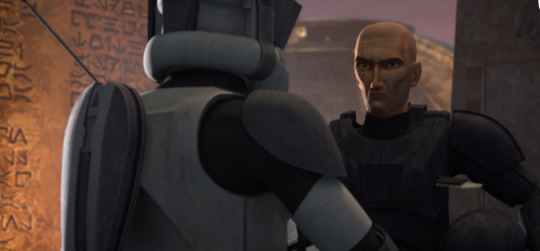
...to relaxed almost-happy-if-you-squint-just-right face)
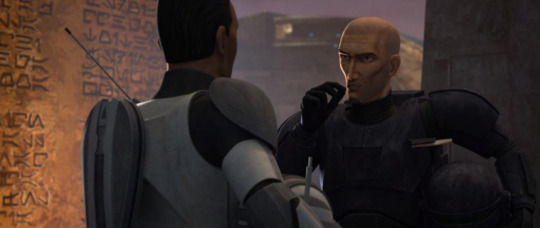
Anyway, while Cody does drop some hints early on that he has doubts about the Empire, he is willing to carry out the mission to rescue "Governor" Grotton, showing he will follow orders to a certain extent. However, he shows more restraint than Crosshair might have: he doesn't attack the civilians despite their obvious mistrust of the soldiers, he comes to an understanding with Tawni Ames, he's NOT willing to follow an order to execute her, and he is clearly dismayed and disappointed by her death.
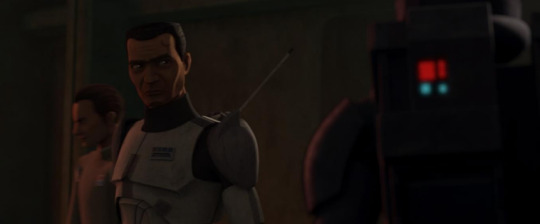
And so, at the end of a "successful" mission, Cody more plainly reveals the depth of his dissatisfaction with following orders against one's own moral scruples:

Hunter had said "Blind allegiance makes you a pawn." And Cody, unwilling to blindly and unquestioningly be a pawn - or act like a battle droid - any longer, goes AWOL.
But that lesson alone isn't enough to make Crosshair turn on the Empire. Instead, he needs Mayday to give him the final push.
MAYDAY
First, Mayday indicates how appalled he is by the idea of anyone leaving their own behind - which we know is a sore spot for Crosshair. But most importantly, Mayday has demonstrated since he was first introduced that he strongly believes in soldiers being loyal to and looking out for each other (which is far different than just being loyal to the Empire).

Second, Mayday unknowingly challenges Crosshair's belief that serving the Empire provides meaningful purpose. (Remember that one of Crosshair's main arguments to his brothers about joining the Empire was so they could "find purpose again.")


Then, he unwittingly goes for the jugular and rips apart the motto Crosshair had adopted.
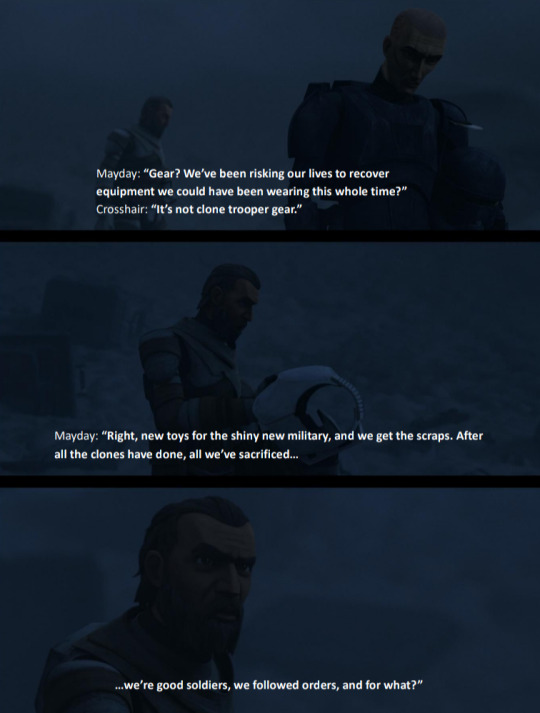
And then, in case Crosshair has any lingering doubts about the answer to Mayday's rhetorical question, Nolan decidedly answers the question for him.

Hunter had said "All you'll ever be to them is a number," and he is proven right in the most heartbreaking way.
Crosshair had accused his brothers of not being loyal to him; unfortunately, now he sees what true disloyalty looks like. And for Crosshair - severe and unyielding - realizing that he has misplaced his loyalty by giving it to an entity that mocks him and casts him AND those he cares about aside for doing so... this is the final straw.
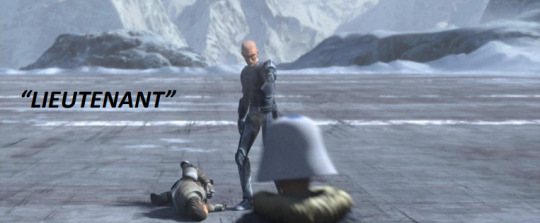
Thankfully, Crosshair has now rediscovered the people who are worthy of his loyalty.
#the bad batch#tbb#clone force 99#star wars#star wars the bad batch#tbb crosshair#commander mayday#tbb mayday#commander cody#tbb cody#lessons learned the hard way#tbb analysis#and now i'm crying#shouldn't have rewatched these episodes#but they are SOOO GOOD#save crosshair#amazing character development in only two episodes#this is longer than i intended it to be - again#but this is what happens when i have to wait four more days for the finale
136 notes
·
View notes
Text
alexsandr kallus is a better fascist turned redeemed hero character than kylo fucking ren because although they both were fascist officers and heavily involved in literal genocide, kallus was the one who had to sit through the aftermath of what he did and actually do something about it. he realized his faith in the system was flawed and horrific and was forced to work with a survivor of said genocide and see the humanity in him, and then because of that, started asking questions and deconstructing his destructive worldview on his own. but that wasn’t enough!!! then he spent a whole season putting himself in mortal peril spying for the rebellion and trying to earn back his moral code and establish the rebellion’s faith in him, and even after he succeeded in that, even after he became a trusted spy, he STILL had to get the shit kicked out of him by heroes and villains alike before finally escaping the empire for good, bruised and bloodied, and THEN HE STILL got mocked and put in his place by teenagers and old soldiers, making sure his ego stayed humble and THEN, BECAUSE THAT WASNT ENOUGH EITHER, HE HAD A GAY HONEYMOON HAPPY ENDING WITH THE MAN WHO GOT HIM TO DEFECT IN THE FIRST PLACE. he even respected women. he was even voiced by david oyelowo. literally characters of all time. kyle ron could never
#star wars rebels#swr#alexsandr kallus#agent kallus#swr kallus#i like his stupid ass they did such a good job of making you despise him and then making you root for him#and a lot of it was bc he fuckin WORKS for that redemption arc its not handed to him in the slightest#he throws his whole isbussy into that shit. also sorry for that tag everyone#mossy speaks#kalluzeb
2K notes
·
View notes